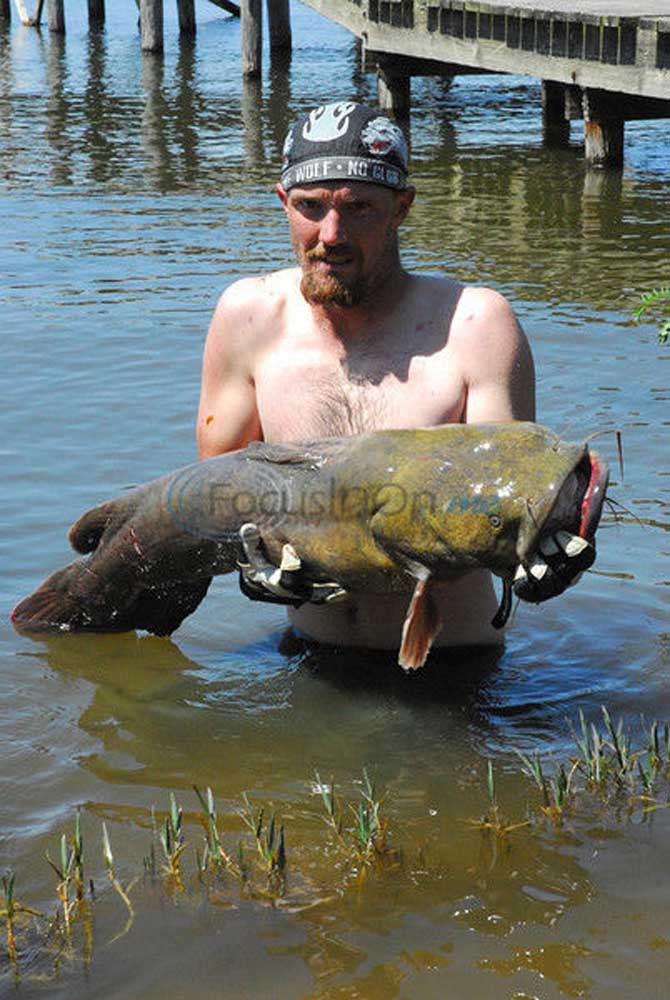Some Noodlers Bending The Rules
Published 10:03 pm Saturday, June 29, 2013

- Steve Knight/Staff
It didn’t take long for handfishing for catfish to lose its innocence.
Heck, as it turns out it may have never had it.
Trending
Legal for the second year in Texas, handfishing has attracted an eclectic group of enthusiastic newcomers and, as it turns out, seasoned veterans.
“I talked to some who said their dads taught them how to do it,” said Texas Parks and Wildlife Department Game Warden Chris Swift.
Based out of Tyler, Swift is one of wardens responsible for Lake Palestine, a lake that is apparently the epicenter of noodling in Northeast Texas. Swift admits his knowledge of handfishing was extremely limited a year ago. With wardens in Smith, Cherokee and Henderson counties having filed about 50 cases for illegal activity involving noodling this spring, Swift now has the equivalent of an advanced degree.
“We are better at enforcing it, but we have more (fishermen) doing it,” Swift said of the technique that is most effective when the water warms and catfish move into crevices to spawn in May and June.
The rules regarding handfishing for catfish are pretty simple in Texas. No bringing in traps and the only tools you can use are your hands, arms or legs.
But it probably comes as no surprise rules are made to be broken in this case, and most commonly by using a stick to move fish around in a hole or some device with a hook to snag them.
Trending
“I have learned they call it a motivator,” Swift said of the plain turning stick. “They use it trying to agitate the fish to get it to turn around.”
The plain sticks are legal in some states, and noodlers say they are a first-line defense from getting hurt by the unknown within an underwater hole, and are indeed used to position a fish so they can grab its mouth and pull it out in the case of a flathead catfish, or in the case of a blue cat have it aggressively grab their arm.
Swift said he learned one group had been using a stick when he stopped them for a boat safety check.
“One of the guys said he didn’t have a paddle. We don’t even require a paddle, but I asked him what happened to it. He said a catfish took it,” the warden said.
That was when he noticed a longer pole in the boat and gained a confession from the fishermen about what they had been doing.
While turning sticks could be eventually legalized by TPWD, sticks with a hook attached won’t be.
“We were getting a lot of hooks,” Swift said. “We got a lot last year and some in May, but in the first part of June it really went down.”
The warden, who said he has made about 15 cases of fishermen using poles with hooks, explained that the devices might be as simple as a gaffe, a pole with a hook on the end or PVC pipe with a hook on one end and the line threaded down through the opening. Where the illegal fishermen have gotten creative is by weighting the device so it sinks out of sight in case they are stopped by a warden.
Swift said it is possible that the number of cases spiked on the lake this year because it has drawn a crowd.
“Lake Palestine is a friendly noodling lake because they can get to a lot of the boat ramps and bulk heads. (The fishermen) tell me there is not a lot of trash on the lake, not a lot of rebar or tree branches,” he said.
Swift added that low lake levels on other lakes have also brought people to the Palestine.
He estimated there have been about five boats a day handfishing on weekends and another couple each weekday.
“We are checking people from further away. I have checked people from Dallas, Houston, Louisiana and Oklahoma,” Swift said. He noted that citations have issued about equally to local and visiting fishermen.
Another sign of there being a history of handfishing on the lake is evident by the number of fish boxes in the lake.
“We know where they are. We are about to go get some of them. I think most of the fish boxes have been there for years. They just move them around,” Swift said.
The legalization and popularity of handfishing has changed one thing on Lake Palestine. Swift said that fishermen used to just be able to drive from ramp to ramp, then wade out and search holes under the launch. Now those have become community holes everyone knows about and are less productive.
Using illegal devices can result in a fine of up to $500, and Swift said some justices of the peace haven’t been shy about doling out the big fines.
Of course there are those, probably some who have been caught, who are accusing wardens of targeting noodlers on the lake. Swift said what they are doing isn’t unlike what they will be doing during deer season when poachers hit the road at night.
“We aren’t anti-noodlers. There are noodlers that are legit, but unfortunately there are some that are doing it illegally,” Swift said.






